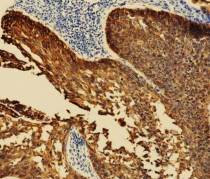ARG66765
anti-MUC4 antibody [SQab20198]
anti-MUC4 antibody [SQab20198] for IHC-Formalin-fixed paraffin-embedded sections and Human
Overview
| Product Description | Recombinant Rabbit Monoclonal antibody [SQab20198] recognizes MUC4 |
|---|---|
| Tested Reactivity | Hu |
| Tested Application | IHC-P |
| Host | Rabbit |
| Clonality | Monoclonal |
| Clone | SQab20198 |
| Isotype | IgG |
| Target Name | MUC4 |
| Antigen Species | Human |
| Immunogen | Recombinant fragment within aa. 1500-2000 of Human MUC4. |
| Conjugation | Un-conjugated |
| Alternate Names | ASGP-1; ASGP-2; HSA276359; MUC-4; Mucin-4; Pancreatic adenocarcinoma mucin; Ascites sialoglycoprotein 1; Tracheobronchial mucin; ASGP; Testis mucin; Ascites sialoglycoprotein 2; Ascites sialoglycoprotein |
Application Instructions
| Application Suggestion |
|
||||
|---|---|---|---|---|---|
| Application Note | IHC-P: Antigen Retrieval: Heat mediation was performed in Tris/EDTA buffer (pH 9.0). * The dilutions indicate recommended starting dilutions and the optimal dilutions or concentrations should be determined by the scientist. |
||||
| Positive Control | Cervix carcinoma tissue. |
Properties
| Form | Liquid |
|---|---|
| Purification | Purification with Protein A. |
| Buffer | PBS, 0.01% Sodium azide, 40% Glycerol and 0.05% BSA. |
| Preservative | 0.01% Sodium azide |
| Stabilizer | 40% Glycerol and 0.05% BSA |
| Storage Instruction | For continuous use, store undiluted antibody at 2-8°C for up to a week. For long-term storage, aliquot and store at -20°C. Storage in frost free freezers is not recommended. Avoid repeated freeze/thaw cycles. Suggest spin the vial prior to opening. The antibody solution should be gently mixed before use. |
| Note | For laboratory research only, not for drug, diagnostic or other use. |
Bioinformation
| Database Links | |
|---|---|
| Gene Symbol | MUC4 |
| Gene Full Name | mucin 4, cell surface associated |
| Background | The major constituents of mucus, the viscous secretion that covers epithelial surfaces such as those in the trachea, colon, and cervix, are highly glycosylated proteins called mucins. These glycoproteins play important roles in the protection of the epithelial cells and have been implicated in epithelial renewal and differentiation. This gene encodes an integral membrane glycoprotein found on the cell surface, although secreted isoforms may exist. At least two dozen transcript variants of this gene have been found, although for many of them the full-length transcript has not been determined or they are found only in tumor tissues. This gene contains a region in the coding sequence which has a variable number (>100) of 48 nt tandem repeats. [provided by RefSeq, Jul 2008] |
| Function | May play a role in tumor progression. Ability to promote tumor growth may be mainly due to repression of apoptosis as opposed to proliferation. Has anti-adhesive properties. Seems to alter cellular behavior through both anti-adhesive effects on cell-cell and cell-extracellular matrix interactions and in its ability to act as an intramembrane ligand for ERBB2. Plays an important role in cell proliferation and differentiation of epithelial cells by inducing specific phosphorylation of ERBB2. The MUC4-ERBB2 complex causes site-specific phosphorylation of the ERBB2 'Tyr-1248'. In polarized epithelial cells segregates ERBB2 and other ERBB receptors and prevents ERBB2 from acting as a coreceptor. The interaction with ERBB2 leads to enhanced expression of CDKN1B. The formation of a MUC4-ERBB2-ERBB3-NRG1 complex leads to down-regulation of CDKN1B, resulting in repression of apoptosis and stimulation of proliferation. [UniProt] |
| Cellular Localization | Membrane; Single-pass membrane protein. Secreted. Note=Isoforms lacking the Cys-rich region, EGF-like domains and transmembrane region are secreted. Secretion occurs by splicing or proteolytic processing. Mucin-4 beta chain: Cell membrane; Single-pass membrane protein. Mucin-4 alpha chain: Secreted. Isoform 3: Cell membrane; Single-pass membrane protein. Isoform 11: Secreted. Isoform 15: Secreted. Isoform 17: Cell membrane; Single-pass membrane protein. [UniProt] |
| Calculated MW | 232 kDa |
| PTM | Proteolytically cleaved into 2 chains, mucin-4 alpha chain and mucin-4 beta chain. mucrnin-4 alpha chain is highly O-glycosylated. mucin-4 beta chain is predominantly N-glycosylated. [UniProt] |
Images (1) Click the Picture to Zoom In
-
ARG66765 anti-MUC4 antibody [SQab20198] IHC-P image
Immunohistochemistry: Formalin/PFA-fixed and paraffin-embedded Human cervix carcinoma tissue. Antigen Retrieval: Heat mediation was performed in Tris/EDTA buffer (pH 9.0). The tissue section was stained with ARG66765 anti-MUC4 antibody [SQab20198] at 18°C - 25°C for 30 minutes.






